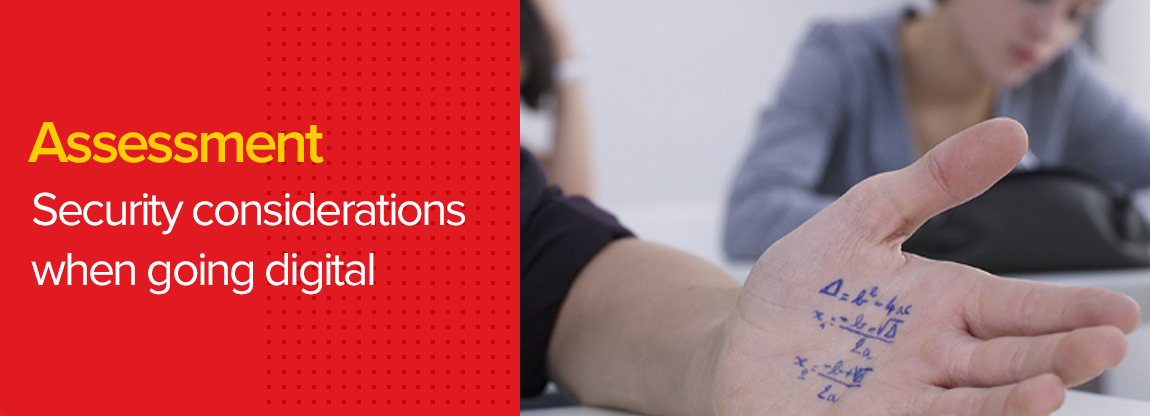Going Digital with your Assessments Efficiently and Securely – Ali Abdullah’s Story
For many of those who have transitioned their classrooms to digital-first environments, the benefits have been plentiful. We’ve heard of better use of time, heightened student engagement, increased efficiencies and –arguably most importantly — boosted learning outcomes. To hear more from our customers on the benefits of going digital, watch this short video here.
Despite these positive results, there is still a long road ahead. We must understand that we can’t see the move to digital solely through rose-tinted glasses. There are issues to overcome. One of those issues, prevalent in the world of digital with even some of the most prestigious HEIs falling fowl to it, is the issue of exam security.
We’re holding a spotlight to this issue in this piece where we will explore exam security with one of our customers, Ali Abdullah, who teaches Spanish at the Community College of Qatar. We spoke to Ali about a breach in security he experienced last year where he took us through what happened, the signs that meant he was initially convinced of something untoward going on, and about how he overcame these challenges.
Ali started using McGraw Hill’s Connect platform in 2016 and in Spring 2017, he took it to the “next level” as he calls it and began using it for both quizzes and exams. “The cheating started as soon as we went digital with our assessment,” Ali explained. And he said that, for him, the red flags, for want of a better phrase, were numerous.
The tell-tale signs
“There were the scores being too high, to start with,” he said, “And then there were the completion rates. They were quicker than I could have done. Additionally, there was just so much activity on their phones or devices in our sessions — so much finger movement.”
“The students were sending screenshots of the quiz questions to one another using Whatsapp. Or, worse still, they’d be working with an external Spanish tutor who they would send the questions to and who would send them back the answers.”
“On other occasions, these tutors were also given access to the Learning Management System we are using, Blackboard.”
While “at its peak” as Ali explained, this continued to happen across a high percentage of his students, and the impact it had on him wasn’t ideal. He talks of feeling disheartened, disappointed, and “betrayed.” Despite detailing that it felt like “being at war; a constant back and forth where I’d be offsetting behaviours continually”, Ali brushed it off and moved on to deal with the matter at hand.
“If there’s a short amount of time, the students won’t be focusing on helping each other, they will be concentrating on getting their own answers right.”
Dealing with the issues
What is also uplifting is the way Ali was able to overcome the challenges he faced. He talked us through his approach to dealing with the breaches he had encountered with the most important one being making sure you’re using a controlled environment or a computer lab for quizzes and exams. He also advocated the use of lockdown browsers. The second recommendation he found was to “remove the mobiles.” Now, they’re banned during quizzes and exams. “Once the mobiles or devices are gone, 80% of the power is gone.”
The third point Ali implemented was the use of the quiz and exam features in Connect by creating a question pool and randomizing the order of both questions and answers, ensuring that each assessment was different for each student. In addition, he added a timer, a feature available in Connect, to the assessments, commenting “if there’s a short amount of time, the students won’t be focusing on helping each other, they will be concentrating on getting their own answers right.”
“If students become independent and more confident learners, they will not need to attempt dishonest ways to succeed.”
And, lastly, Ali is a firm believer of allowing open notes and of using the Check My Answer feature in Connect. Keeping in mind that there is a timer, this served two purposes. First, without a lockdown browser, it discouraged the use of internet resources like translators and language websites. Second, and most importantly, it encouraged students to be more independent learners and more confident in their abilities. Contrary to even his own initial fears, the use of open notes and “Check My Answer” did not result in grade inflation, but rather resulted in the most balanced quiz and exam scores since going digital with Spanish assessment. “If students become independent and more confident learners, they will not need to attempt dishonest ways to succeed.”
Now, Ali explained, the situation has been remedied entirely and the cheating has stopped. Ali is now guiding others at his HEI on protocol around exam security and is beginning to run professional development courses on the subject over the next couple of months. Summarising his experience with exam security, Ali said, “You have to show your students you’re determined and not give up.”
To read more on Ali’s success with Connect, check out the case study here.
We produce a range of simulated exercises and games that support the notion of "learning by doing" and can help you create a challenging, creative and competitive educational environment where 21st century learners will thrive. If you would like to learn more about how we can support you with this, please contact us here.
Sign up to our newsletter

